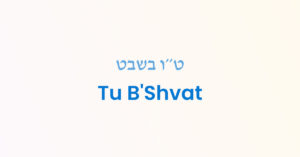This coming Shabbos, we will celebrate Tu B’Shvat, the “new year” for trees.1
As we wish “happy birthday” to the trees, let’s ask if they can share with us a few words for this special occasion. If you could speak to a tree, what would it tell you?
If you could speak to a tree, what would it tell you?
A World of Lies
When we look around the world, we can see so many beautiful things – magnificent trees, flowers, fruits, and a beautiful sunrise. It’s easy to just take all this beauty for granted.
Of course this flower is beautiful; flowers are always beautiful. Of course this tree stretches tall into the sky; trees often grow high like that. Of course the sun rises every day and illuminates the world with awesome streaks of color; this happens every morning.
The flowers, trees, and sun impress us with their silent beauty. But if they would be able to speak, they would be itching to tell us something very important.
“Look at me!” the apple would tell us. “Do you see how I’m so delicious and crunchy? Do you see how I have this perfect skin to protect me from insects and from getting spoiled and brown? Do you think I made it myself? I created my own skin? Of course not! There was a brilliant Creator who created me with tremendous kindness because He wanted YOU to enjoy His world!”
But the apple says nothing. It doesn’t tell you that Hashem created it. It just pretends to be existing on its own, or that it just magically appeared in the supermarket.
For this reason, this world is called “Olma D’Shikra – A World of Lies”2 and Olam Haba is called “Olam HaEmes – The World of Truth.” In this world, the truth is hidden from us that Hashem is our Creator. It’s as if all of the creations are lying to us, by making it seem as if their existence is natural and they exist on their own accord. The trees are silent, not telling us the truth about their Creator.
In this world, the truth is hidden from us that Hashem is our Creator.
Our job is to look at the world with a discerning eye – to reveal the Emes (truth) and to see through the illusion of nature.
The Hidden Inventor
Imagine that you are an inventor and just created a new device that when you pick it up, it lets you fly to wherever you want to go. You can’t wait to reveal this powerful new device to the world, and are so excited to see how much people will appreciate it.
You go into an open field and place the device down on the ground. You hear footsteps approaching from the distance so you run and hide behind a tree to watch what will happen. You see a little boy about 6 years old walk over to the device. He picks it up, and suddenly – he starts flying. “Wheeeee! Look at me!” he cries. “I can fly wherever I want!”
The boy’s mother finally catches up behind him. “Oh my goodness!” she cries. “I can’t believe it! That thing Shimmy picked up seems to let him fly anywhere! I can’t wait to try it out myself – no more traffic jams or subways, ever! Whew, what a crazy world we live in. Amazing things just fall from the sky, it’s unbelievable!”
Meanwhile, from your hiding spot behind the tree, your jaw drops in astonishment. “Fall from the sky?!” How could she possibly think this device just fell from the sky?! Why doesn’t she stop and wonder where it came from, and who invented it?
This is how Hashem feels (kivayachol), when we enjoy His creations without wondering where they came from. Hashem created this entire world full of beautiful trees, fruits, and wondrous creations for man to enjoy… but we rarely pause to notice where they came from. When we enjoy the pleasures of this world without noticing or thanking Hashem, it is a tremendous insult to our Creator.
But we rarely pause to notice where they came from.
Chazal knew that we are likely to forget about Hashem, which is why they instituted the practice of saying brachos. Every time we make a bracha – whether on a food or on a wondrous sight like lightening – we are forced to stop and acknowledge our Creator.
This Tu B’Shvat, let’s listen to the message of truth that the silent trees wish they could tell us – about our brilliant Creator who created this entire world for us to enjoy.
Sources: [1] Rosh Hashana 1:1; [2] See Yalkut Shimoni on Shmuel Alef Perek 28 and Sifsei Chaim Middos V’Avodas Hashem, Vol. I. pg. 44
Your Challenge
Before eating a food, acknowledge that Hashem created it – in your own words.
For example:
- “Thank you, Hashem, for creating this food for me to enjoy.”
- or “Even though it looks like this apple appeared here by itself, or just came from the supermarket, I know, Hashem, that you created it.”


